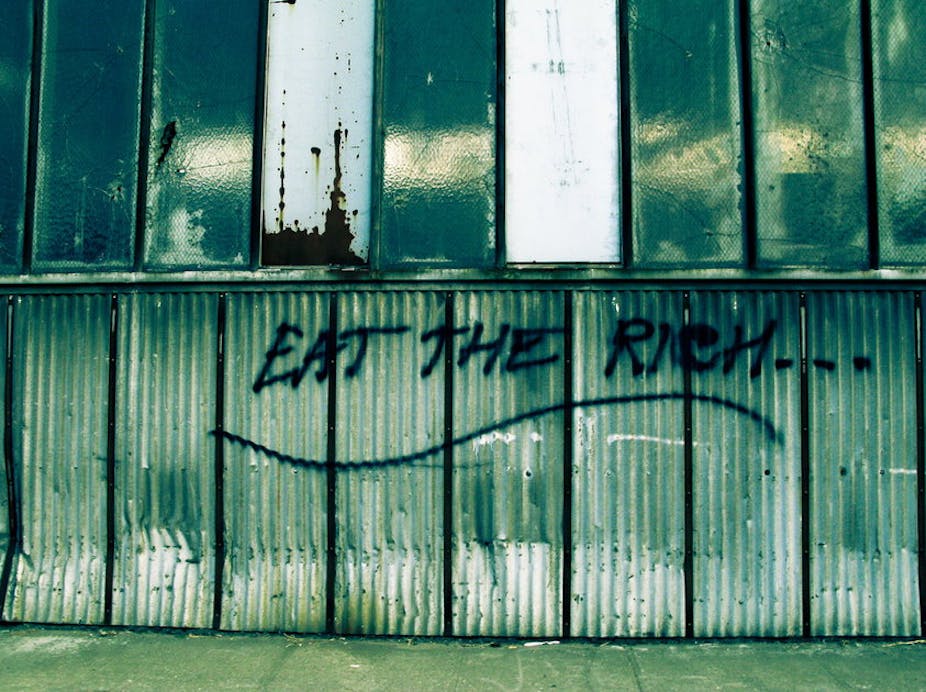Do the words we use to speak of economic matters, matter? I believe they do, but not by the propagation of textbookish jargon. Rather, the main way they matter is in shaping public ethics.
Economics has been a technical field of studies for a few centuries now and is replete with textbooks full of ideas expressed in precise and often mathematical language, passed down through a priestly class of scholars.
These ideas and the words that carry them – words such as efficient markets, consumer surplus, opportunity cost, productivity, rent seeking, for instance – seep through to an intellectual class of, among others, journalists, managers and public servants.
Some words improve the public discussion of economic policy because they carry important economic ideas – gains from trade, tax incidence, public good, for example. Economists are broadly united in seeing value in the wide adoption and use of these utility words. They actively monitor and police their use and abuse.
But against this are hygiene concerns: this happens when economics words go places they are unwelcome – talk of efficient allocation of resources in the domain of public funding of the arts, for instance; or speaking of the costs and benefits of free trade, or certain types of medical interventions, or markets that are considered repugnant.
Some words – such as “rational choice” – carry to other scholarly domains, such as political science and sociology, that in turn have invented prophylactic incantations, such as “neoliberalism”, to limit such contamination.
Economics words go a lot of places uninvited, and are not always well treated when they get there. At least that’s the story for professional words.
Explaining our riches
But there is another story about economic words that is told by Deirdre McCloskey – a Professor of Economics and of English literature – in the course of two volumes (of a planned four-volume set) on what she calls the Bourgeois Era – The Bourgeois Virtues (2006) and Bourgeois Dignity (2010).
McCloskey seeks to explain the great puzzle of economics – why were we all so poor for millennia upon millennia, then suddenly, starting in the 18th century in the northwest-corner of Europe – whoosh! Now a few centuries later we’re 20 times richer. In the standard story of this “industrial revolution” it was technology – steam engines, power looms, and science – that did it. That story is compelling, up to the point where you realise that lots of other places had technology too, and sooner, for example 13th century China.
Another group of economists claimed it was institutions that did it – property rights, rule of law, that sort of thing. This story also mostly works for timing and place, and makes a compelling political economy narrative. Like the technology story, the institutions story explains how a process, once started, then continues. But it doesn’t actually explain how the process got started.
McCloskey argues that what started to change in the 17th century was not technological or institutional, but change in the ideas about the dignity of commercial pursuits – a change in rhetoric, or words about economic activities. In the ancien regime honourable sources of wealth were associated with landholdings, titles, with earthly and spiritual power. Those with incomes that derived from trade and commerce were dishonourable, a staple of most religions.
But this dishonour is like a tax, and as with any tax its incidence reduces supply. The 17th century repeal of that ‘dishonour tax’, by increasingly speaking well of the bourgeois, first in Holland, then in England, as a shift in the ethical understanding and rhetoric associated with market-based economic activity was the fundamental change that launched modern prosperity.
I’m rich, don’t judge me
McCloskey’s point is that the words we use about economic activities matter because they carry ethical valuations. Her point is that a shift in these ethical valuations, in the rhetoric, was the cause of the rise of modern prosperity – of the modern world no less – but that this can also reverse, by the same process, by a re-imposition of the dishonour tax associated with tolerance of commercial activity, or a sense of its dignity.
We can run this argument the other way too. In the early 1970s or so, a bunch of economists started talking in a new way about the economics of politics – eventually crystallising in the idea of rent seeking. A broader public understanding of rent seeking is a way of applying a dishonour tax to political ways of earning income – which are ways that impoverish us all (although enrich insiders or cronies).
This is why the words of economics matter – not only as a method of explaining models and theories to new generations of students, but far more importantly as a way to explain the origin and continuity of modern prosperity, and its vulnerability to rhetorical assault.
This is the second piece in our series on the language of economics. Click on the links below to read the others.

